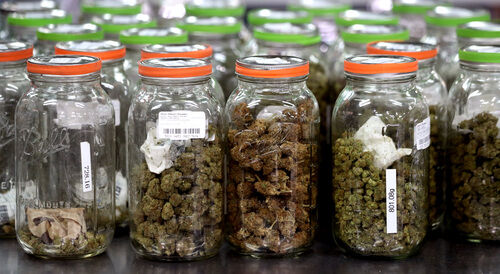Tucson is preparing specific zoning regulations for adult-use marijuana facilities receiving social equity licenses as the state’s health department is set to announce which entities will receive them in the coming weeks.
The city’s mayor and council voted unanimously last Tuesday to direct city staff to begin drafting a special exception process that would impose certain conditions on recreational facilities in city limits.
A key provision of Prop. 207, which legalized adult-use recreational marijuana in the state, calls for Arizona to release 26 social equity licenses to “people from communities disproportionately impacted by the enforcement of previous marijuana laws.”
The Arizona Department of Health Services is revealing the winners of those licenses in a lottery-style drawing on Friday, April 8.
The City Council’s discussion on social equity licenses came at the request of Mayor Regina Romero, who wrote in a memo requesting the item: “Many persons who were disproportionately impacted by the enforcement of prior marijuana laws were excluded entirely from applying due to overly restrictive eligibility criteria.”
AZDHS imposed a $4,000 fee to apply to obtain a social equity license, which critics point out restricts access to the low-income residents from underserved communities the licenses were intended for.
And while the rules prohibit a pre-existing agreement with large multi-state cannabis companies, after being issued, the licenses can be transferred to the cash-heavy marijuana establishments that would not have qualified for the license in the first place. The Arizona chapter of NORML, which advocates for reforming marijuana laws, estimates the licenses are worth $10 million to $20 million.
The process of figuring out the special exception rules will take about six months, according to City Attorney Mike Rankin, and will establish the terms of where a facility can locate and the conditions of its operations. Those conditions will then be presented to mayor and council for approval.
Rankin said city staff will consider zoning conditions that encourage dispensaries to “bring business and commerce to those areas that were supposed to benefit from this structure, this idea of social equity in the first place.”
‘It’s not going to solve everything’
In April 2021, the City Council adopted a temporary moratorium on social equity licenses within the city to participate in the state’s rule-making process for issuing them, specifically “to advocate for rules that will ensure that Social Equity licenses are ultimately issued to applicants who represent the minority communities that were disproportionately impacted by the enforcement of earlier marijuana laws,” the motion said.
But the city’s advocacy didn’t spark the changes it hoped for, Romero said at Tuesday’s meeting.
“AZDHS didn’t really take into account the concerns that mayor and council had in terms of social equity licenses,” she said. “The process that AZDHS put together really allowed for corporate dispensaries to really take advantage of the AZDHS process. And so I just want to make sure that we initiate the process and have a fair process in front of us.”
Only dispensaries with medical-only or both medical and recreational services can currently operate in the city.
Eventually, city staff will bring recommended changes to the city’s zoning codes for adult use only facilities that, once adopted, will allow them to operate in the city under the new rules the council approves.
“A special exception process would allow us to provide feedback and other concerns. It’s a very similar process that we use for liquor licenses that all of them come to us,” Romero said.” It allows for the public to give input and feedback as well as mayor and council be able to provide that additional direction to be able to get the results that we want as a community.”
Councilman Steve Kozachik agrees the public outreach component of a special exception process would be a key tool for the city.
“One of the most important things is (the special exception process) requires a public process,” Kozachik said. “The potential owners are going to have to meet with neighbors and city staff to look at the logistics of the area.”
However, Kozachik admits, “it’s not an elixir fixer, it’s not going to solve everything.”
The special exception process would only apply to the city’s zoning rules, as the state has control over who receives a license.
“(The special exception process) can’t be about their bank account. It can’t be about personal characteristics. And that, unfortunately, is what the state has missed. The pot industry is absolutely heavily driven by cash,” Kozachik said. “That means by definition that the only people who are really taking advantage of these things are people who’ve got a lot of cash backing. And that’s not going to be the guy who got busted for an ounce back in ‘75.”
The state health department is not issuing the licenses geographically, so it’s unclear where the licensees will end up throughout the state. Other Arizona cities, such as Phoenix, Tempe and Flagstaff, are also considering special exception procedures, and Tucson is keeping a close eye on them to inform its own process.
“This is a new beast, to some extent,” Rankin told City Council. “So we understand the desire to have a special exception so that there is a final say about the approval of a particular location on a particular application.”





